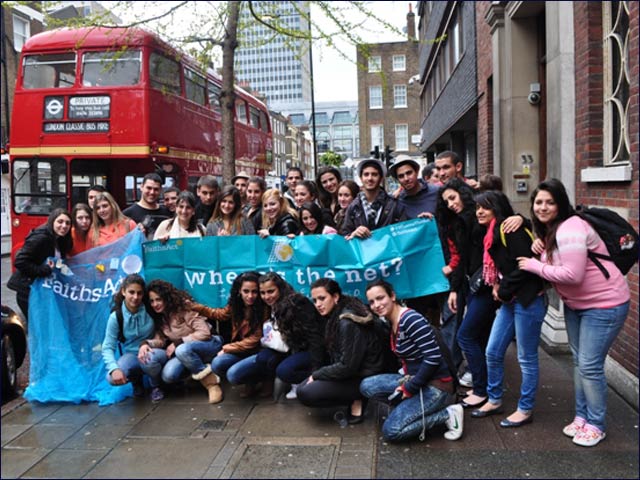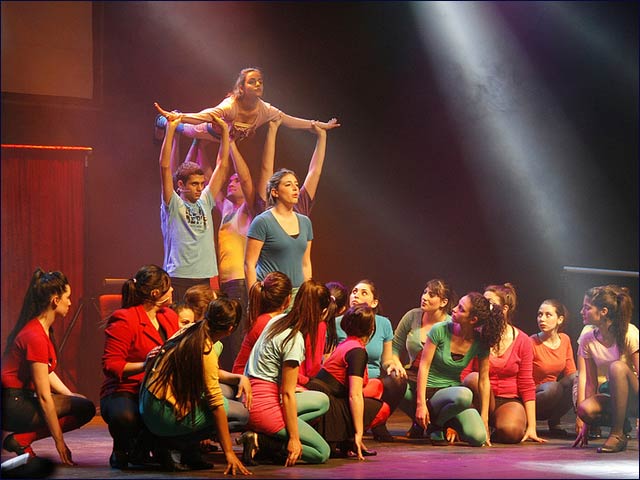By Avigayil Kadesh
Performing an original, trilingual musical production, Muslim and Jewish teenagers from the Haifa area imparted the message -- locally and in European countries -- that “through direct experience of one another on an equal basis, we can overturn traditional fears and stereotypes and live in peace together.”
Step By Step-Sauwa Sauwa is loosely based on A Chorus Line, giving glimpses into the lives of youthful performers auditioning for a musical starring Arab and Jewish teens. Each candidate walks to the front of the stage to answer questions about his or her aspirations, dreams and national identity.
The play opened the 2012 Haifa Young Artists Festival in March, and was performed in Zurich and in London in April before premiering back home in Haifa on June 13. The teen troupe toured Germany in December 2012, winning praise and a monetary prize from Chancellor Angela Merkel. Foreign subtitles were electronically displayed on large screens along with images to enhance the characters’ personal stories.

The mixed cast has performed so far in London as well as in Zurich
Israeli director Yuval Ben Yehuda filmed a documentary about the making of the show, intended for use in schools, discussion groups and special events in Israel and abroad. The documentary was shown at an international youth conference in LA and at private screenings.
Inspired by a bold coexistence project
“Step by Step was inspired by Friends Forever: World Peace Grown Locally, a Rotary-supported project started many years ago for conflict resolution in Northern Ireland,” explains Carol Brauner, past director of international relations at Haifa’s Leo Baeck Education Center, a progressive campus covering pre-K through high school.
"It was so successful in bringing Catholic and Protestant youth together that Rotary decided to see if it could have a similar impact on Muslim and Jewish Israeli youth, and in the summer of 2011 Leo Baeck was invited to participate.”
The year-long Friends Forever program started with a two-week retreat at a New Hampshire house for five Leo Baeck 11th-graders and five Muslim peers from Ein Mahel School near Nazareth, accompanied by a Leo Baeck adviser. Brauner describes the participants as “very open-minded Jewish kids” and traditional Muslims, including girls wearing headscarves.
“Suddenly they’re all part of one group dealing with daily life, with no contact from home. They went on an overnight trek to an Indian reservation, volunteered in a brain trauma unit and in a soup kitchen, and gave talks in pairs in a mosque, a synagogue, a church and a community center. They decided to speak to each other in English, and they decided when they came back they’d advance the cause of peace by speaking at schools, creating music and sports events, and doing political advocacy.”
When the Haifa participants came to Brauner in July 2011 for ideas, she suggested to Leo Baeck CEO Dani Fesler that a performing arts program could be facilitated through Baeck’s 27-member Carmellim vocal troupe. Fesler engaged a professional choreographer and director, and a musical score was written with student input. He then invited kids from Ein Mahel to come for tryouts.
“Fifty 15- to 18-year-old Muslim kids turned up for the audition – all kids who never did anything like this before,” says Brauner. “Ultimately, 15 were chosen. We presented them with a fait accompli -- an Arab-Jewish original musical -- and if they didn’t like it they could drop out. All of them wanted it to succeed, and they understood they had to cooperate.”
Many staffers and parents were skeptical that the project could succeed. However, “When you cooperate, things happen,” says Brauner. “Just sitting to eat together at rehearsals four times a week after school makes a difference. We saw [Muslim and Jewish] girls sharing lipstick, for example.”
The Carmellim members had the advantage of professional training, but rather than displaying impatience with the novice Arab teens, they aided them and even covered for their mistakes, says Brauner.
“We had to be united as a troupe, not as a group of Jews and a group of Arabs,” says cast member Kim Ben Akiva on the documentary. “But truly as a troupe. And that was hard for us.”

Four weekly rehearsals bonded the multiethnic group together
Of course, all was not idyllic. “It was a roller-coaster of emotions -- not an easy ride,” Brauner says. “We’ve all learned so much, including how much we needed to learn. There are serious issues among the kids, and if you give them a safe space, they want to discuss and confront these issues. But they can express their emotions and then get back on stage together.”
New friends
Most of the cast members have become close friends.
Muhammad Abu-Leel, the only Step by Step participant who was also in Friends Forever, says that he “always thought Jews were human like anyone else,” but never had Jewish friends before these experiences. “I have a lot of friends from Leo Baeck now.” They speak in Hebrew and sometimes in English.
“Our goal is to show people that there is a lot in common between Arab and Jewish kids, and they can be together peacefully without war,” says Muhammad. His favorite part of the play, he adds, is “singing one song together in Hebrew and Arabic. That is so cool.”
Adds Ronni Sabba, a Haifa student: “I don’t believe that after this project anyone could hate the other side.”
Brauner relates that the project has also had a big effect on parents from both communities, who sat together at three Haifa performances supported by the municipality. Private donors contributed the rest of the budget.
“It’s not just about the kids, but about all of us,” she says. “We see it as an ongoing process that has the potential to unite Israeli Muslim and Jewish youth in a project with shared goals and where everyone is equal.”
For the second season, a large number of students came to audition, and cast members who stayed on for a second year are mentoring the incoming members. “We do a lot of Arab-Jewish coexistence work here at Leo Baeck,” Brauner explains, “including a summer camp and early childhood program for Arab children at risk, but it’s getting harder to get teens together. This was a creative experiment and, thanks to our visionary CEO who had the guts to do this, it works.”
Step by Step-Sauwa Sauwa characters
Arab Youth:
| Haula: |
Dreams of being a dancer and escaping her family and home |
|---|
| Magda: |
Loves history and is very knowledgeable about the conflict |
|---|
| Rafik: |
Sings in a band about the frustrations of Israeli Arabs |
|---|
| Daud: |
Told his friends that he is a dancer in Britney Spears shows |
|---|
| Diana: |
Loves acting, is scared of humiliation, is more than just an “extra” |
|---|
| George: |
School dropout. Loves the fantasy world of the stage |
|---|
| Yussuf: |
Wants his parents to be proud of him |
|---|
| Maya: |
Eyal’s girlfriend; dreams of being a dancer |
|---|
| Eyal: |
Maya’s boyfriend; a spoiled, self-centered boy |
|---|
| Ortal: |
Believes she is not pretty enough |
|---|
| Miki: |
His sister was in a youth troupe. It’s a family tradition |
|---|
| Keren: |
A pushy mother has turned her into a rebel |
|---|
| Revital (Revi): |
All she ever wanted is a large, warm family like the Arabs have |
|---|
|
| |